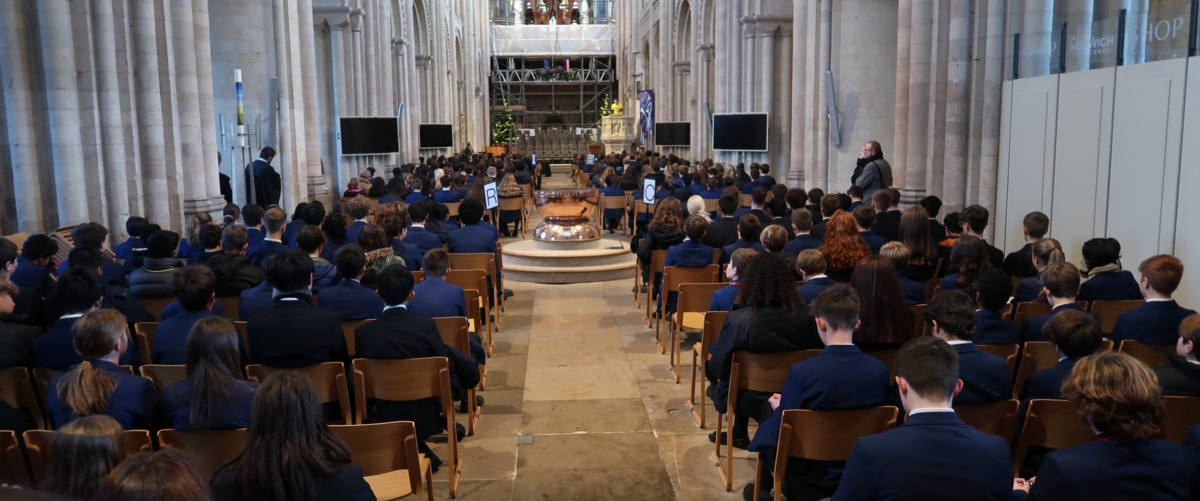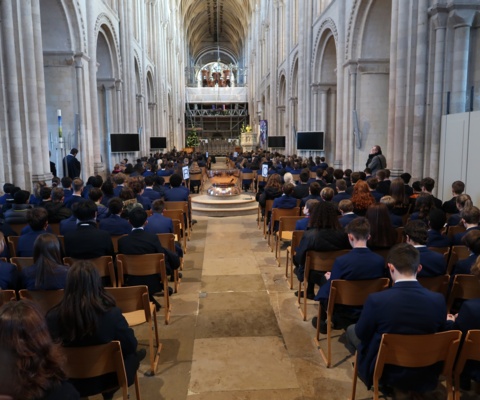The reading in this morning's assembly in the Cathedral was Luke 10:25-37. Revd Corin Child reflected on this in his assembly address, which you can read here:
We’ve just heard the well-known story of the Good Samaritan, where a traveller in trouble fails to get any help from two supposedly religious men who pass by on the other side, before receiving generous help from a Samaritan, an unpopular type of person among the crowd Jesus was speaking to.
The conversation either side of the parable is important. It begins with a religious lawyer standing up and, we’re told, testing Jesus with a question: “What must I do to inherit eternal life?”. His meaning is: what, hypothetically speaking, should I or any person do to be legally in the right with God? They have a conversation about the most important rule in the Jewish written law: love God and love your neighbour. Simple, says Jesus. Go and do that.
But the lawyer, being a lawyer, hasn’t quite finished. Hang on, he says, we haven’t yet pinned down the technical definition of a neighbour. So Jesus tells his story about two people who didn’t help, and one who did. At the end of it he asks the adroit question, “Which of these three do you think acted like a neighbour?”
With that, Jesus has turned the whole debate around. The lawyer’s question about who his neighbour is, who he has technical responsibility for, is the wrong one. A better question, the one Jesus is interested in, is: “How can I be a good neighbour to whoever I meet?” It’s such a good point that this parable has passed into the language. If someone thanks you for being a Good Samaritan, then well done for what you did.
I think we’re instinctively impressed by generous neighbourliness whenever we come across it. The World Fair Play Awards are an annual recognition of neighbourliness in sport. If you go to the Fair Play International website, there are extraordinary examples of kindness in the midst of competition, going back to 1965 when the award began. On that occasion, the award went to an Italian, Eugenio Monti, who was competing in the bobsleigh at the Winter Olympics.
Here was the situation: Monti had completed his run and was currently in first place.
There was only one remaining competitor who could beat him, the British competitor Tony Nash. But Nash had a problem – a critical piece of his bobsleigh had broken, and with faulty equipment he would have to withdraw. With remarkable unselfishness in such a competitive environment, the Italian saw Nash’s problem, unbolted the relevant part of his own bobsleigh, and gave it to his rival, so that Nash could make a quick repair and compete…
… which he did very well. Tony Nash flew down the bobsleigh course to win an Olympic gold medal, beating Eugenio Monti. However it seemed right then, as I think it does now, that the Italian should receive a special congratulation, which is why he became the winner of the first World Fair Play Award.
If you’re left with the lingering question “was it worth it?”, let me point out one thing. I would have no idea who won or who competed in the 1965 Winter Olympic bobsleigh if it wasn’t for this story – and I doubt you would either. Being a good neighbour, in whatever walk of life, is impressive and memorable. As Jesus said at the end of his parable – Go and do likewise.


